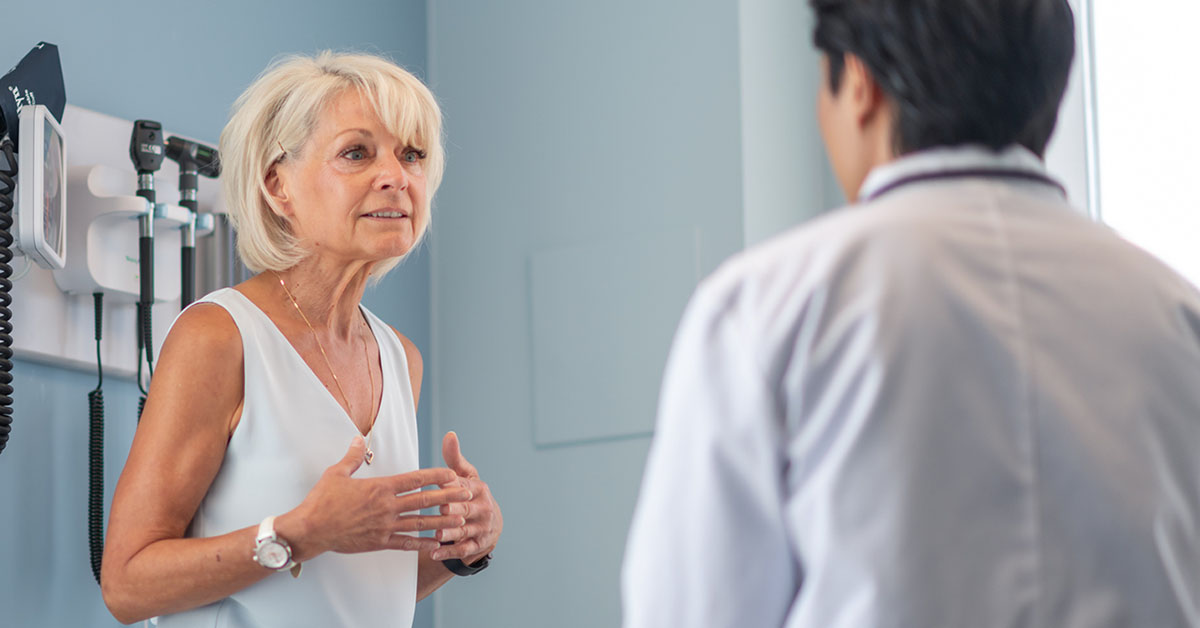
Do You Need a Cancer Screening This Fall?
-
If you cleared your summer calendar to make time for more warm weather fun, fall may feel like the right time to tackle some things on your to-do list. That might include important health tasks, like getting screened for cancer.
Screening tests can help catch many types of cancer early, when they’re typically easier to treat. Some screening tests can even prevent cancer by finding cell changes that can be treated before they turn cancerous.
Here’s a rundown of the American Cancer Society’s current recommendations for six common cancers that can be screened for. Take a look—then talk with your doctor to decide which tests might be right for you and how often you should get them.
Skin cancer screening
- All adults can ask their doctor to perform a skin exam during a routine checkup.
- All adults should check their own skin once a month from head to toe. If you notice anything unusual, let your doctor know.
Breast cancer screening
It is recommended that all women over the age of 25 undergo formal risk assessment for breast cancer.
If you’re found to be at average risk for breast cancer, you should undergo annual screenings beginning at age 40. These annual screenings should continue until your life expectancy is less than 10 years.
Higher risk considerations
You may be at high risk of breast cancer if you have:
- A personal history of breast cancer (especially if you were diagnosed before age 50), a precancerous condition of the breast, or ovarian cancer
- A gene mutation that puts you at a higher risk of developing breast cancer, such as a BRCA1 or BRCA2 gene mutation
- A personal history of radiation to the neck, chest, or underarms (mantle field) between the ages of 10 and 30
- A family history of breast cancer (on either your mother’s or father’s side)
In these cases, you should get a mammogram and an MRI scan every year, starting at age 30.
Learn more about breast cancer screening.
Prostate cancer screening
At age 50, men should talk with their doctor to decide if prostate cancer screening is right for them.
Higher risk considerations
Men at higher risk of the disease should ask their doctors about starting the screening at age 45. You may be at higher risk if you’re African American or if your father or brother had prostate cancer before age 65.
See the latest prostate cancer screening guidelines.
Cervical cancer screening
- Women 21 to 29 years old should get a Pap test every three years.
- Women 30 to 65 should get both a Pap test and an HPV test every five years or a Pap test alone every three years.
- Women over 65 who’ve had regular cervical cancer testing in the past 10 years with normal results don’t need to be tested. However, women who have a history of a serious cervical precancer should continue to get Pap tests for at least 20 years after that diagnosis, even if testing goes past age 65.
Higher risk considerations
Women with certain health conditions may need to be screened for cervical cancer more often. These include women who are HIV-positive, had an organ transplant, were exposed to DES, or used steroids long-term.
Colorectal cancer screening
- Adults 45 years and older should get regular screenings. Your doctor can help you decide which test is best (there are several options, including a colonoscopy) and how often you should be tested.
Higher risk considerations
You may need to be screened before age 45 or more often if you have a family history of colorectal cancer or if you’ve had or have irritable bowel disease.
Learn more about colorectal cancer screenings.
Lung cancer screening
Yearly low-dose CT scans may be right for people in certain high-risk groups. You should talk with your doctor about lung cancer screening if you meet all of the following conditions:
- You are 50 to 80 years old
- You have a history of heavy smoking - for example, you have smoked the equivalent of a pack a day for 20 years
- You are still smoking or have quit within the last 15 years
Screening is important; and it is something that each and every one of us can do as a part of our health routine. Making an appointment to get screened isn’t always the most convenient, but the potential early detection of cancer certainly makes it worth it.
